![]()
By ~Dovey

Prologue: Echoes of Artistry
Precious are they who came before,
reflective in their rhymes -- what's more --
offering us inspiration,
legends for interpretation,
omniscient in their worldly views,
gleaned wit and wisdom from their muse --
Utopian or jaded soul;
expert with words oft will cajole.
Expect to read of Greek affairs,
cry with the masters of despair,
have tea with those who thrilled great kings,
or lend an ear as caged bird sings --
extol the virtues of The Bard,
salve the wounds of those battle scarred.
Or dream of love, as lovers do;
for they are passionate and true.
As we aspire to learn this craft;
revise, rewrite, trade draft for draft,
there in the thumb worn dusty tomes
inscribed in ink from ancient homes
seek proof our voices will be heard,
that value's rich in written word -
relish this month of poetry;
you'll be immersed in artistry.
![]()
By ~Dovey
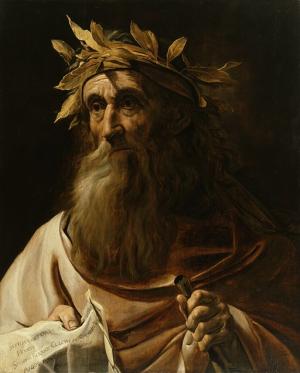
Homer
Heroic were the tales
Homer told. When ship sails,
his Odyssey unfolds.
Hyperion's wrath was
historically exposed;
honoring Ulysses,
his travels and his woes.
KAW 4-1-17
| Author Notes |
Artwork: Portrait of Homer (1639)
English: The old man honored by a laurel wreath is Homer, the greatest poet of antiquity, identified by the inscription on the sheet of paper with the names of the cities that claimed Homer as a native. This imaginary portrait (no one knows what he looked like) is not so much a celebration of the author of the early Greek epic poems- The Iliad and The Odyssey- but of the fame that a poet could achieve. This splendid painting is dated but not signed. The forceful modeling suggests a Flemish painter influenced by Caravaggio (Italian, 1571-1610). It hangs in Walters Art Museum. Biography of Homer Homer poet (an excerpt from https://www.poemhunter.com/homer/biography/) In the Western classical tradition, Homer is the author of the Iliad and the Odyssey, and is revered as the greatest ancient Greek epic poet. These epics lie at the beginning of the Western canon of literature, and have had an enormous influence on the history of literature. When he lived is controversial. Herodotus estimates that Homer lived 400 years before Herodotus' own time, which would place him at around 850 BC; while other ancient sources claim that he lived much nearer to the supposed time of the Trojan War, in the early 12th century BC The formative influence played by the Homeric epics in shaping Greek culture was widely recognized, and Homer was described as the teacher of Greece. Homer's works, which are about fifty percent speeches, provided models in persuasive speaking and writing that were emulated throughout the ancient and Medieval Greek worlds. Fragments of Homer account for nearly half of all identifiable Greek literary papyrus finds. Homeric dialect The language used by Homer is an archaic version of Ionic Greek, with admixtures from certain other dialects, such as Aeolic Greek. It later served as the basis of Epic Greek, the language of epic poetry, typically in dactylic hexameter. ~~~~~~~~~~~~~~~~~~~~~~~~~~~~~~~~~~~~~~~~~~~~~~~~~~~~~~~~~~~~~~ One day I'll be brave and tackle an epic poem. However, today is not that day, as I am swamped with Alaska Nanook Hockey banquet set up and the banquet itself. I managed to get the poem written but had no internet access to post until we got home, just before midnight. Thus, the time stamp here will reflect April 2nd. For the record though, I wrote the poem in the afternoon between my many banquet tasks. Thanks for reading! Kim (April 1st), I honor Homer with a Pleiades poem. (Excerpt from Shadowpoetry.com) This titled form was invented in 1999 by Craig Tigerman, Sol Magazine's Lead Editor. Only one word is allowed in the title followed by a single seven-line stanza. The first word in each line begins with the same letter as the title. Hortensia Anderson, a popular haiku and tanka poet, added her own requirement of restricting the line length to six syllables. Background of the Pleiades: The Pleiades is a star cluster in the constellation Taurus. It is a cluster of stars identified by the ancients, mentioned by Homer in about 750 B.C and Hesiod in about 700 B.C. Six of the stars are readily visible to the naked eye; depending on visibility conditions between nine and twelve stars can be seen. Modern astronomers note that the cluster contains over 500 stars. The ancients named these stars the seven sisters: Alcyone, Asterope, Celaeno, Electra, Maia, Merope, and Tygeta; nearby are the clearly visible parents, Atlas and Pleione. The poetic form The Pleiades is aptly named: the seven lines can be said to represent the seven sisters, and the six syllables represent the nearly invisible nature of one sister. |
![]()
By ~Dovey
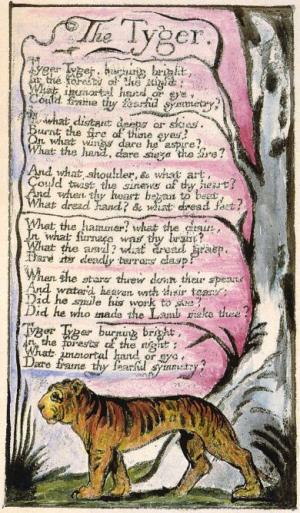
Who is this Blake to Thee?
My thirst for poetry to slake;
I sought to see
what's he to me -
a poet I shall not forsake.
In an epigram;
his catalogued apology;
come share a dram,
who gives a damn?
His wit -- a madman's prodigy.
And what could burn brighter
than a Tyger by candlelight
as a writer
pulls all-nighter,
enamored; Blake instills insight.
His voice we must hear!
Ink left for all posterity;
allays your fear,
may shed a tear -
his work brought me such clarity.
KAW 4/2/17
| Author Notes |
The artwork was found in a public domain Google search and depicts one of his most famous poems. (see below)
My poem is an emulation of his: Hear The Voice Of The Bard - Poem by William Blake Hear the voice of the Bard ! Who present, past, and future sees; Whose ears have heard The Holy Word, That walked among the ancient trees, Calling the lapsed soul, And weeping in the evening dew; That might control The starry pole, And fallen, fallen, light renew! 'O Earth, O Earth, return! Arise from out the dewy grass; Night is worn, And the morn Rises from the slumberous mass. 'Turn away no more; Why wilt thou turn away? The starry floor, The watery shore, Is given thee till the break of day.' Biography of William Blake (an excerpt from https://www.poemhunter.com/william-blake/biography/) An English poet, painter, and printmaker. Largely unrecognised during his lifetime, Blake is now considered a seminal figure in the history of both the poetry and visual arts of the Romantic Age. His prophetic poetry has been said to form "what is in proportion to its merits the least read body of poetry in the English language". His visual artistry has led one contemporary art critic to proclaim him "far and away the greatest artist Britain has ever produced". Although he lived in London his entire life except for three years spent in Felpham he produced a diverse and symbolically rich corpus, which embraced the imagination as "the body of God", or "Human existence itself". Insight to this poet's process: https://en.wikisource.org/wiki/Blake%27s_apology_for_his_Catalogue I really enjoyed reading, "Blake's apology for his Catalogue." You'll also see illustration of his original notebook pages. Interesting stuff! And, the work which is most anthologized in the English language: The Tyger by William Blake Tyger! Tyger! burning bright, In the forests of the night, What immortal hand or eye Could frame thy fearful symmetry? In what distant deeps or skies Burnt the fire of thine eyes? On what wings dare he aspire? What the hand dare seize the fire? And what shoulder, & what art, Could twist the sinews of thy heart? And when thy heart began to beat, What dread hand? & what dread feet? What the hammer? What the chain? In what furnace was thy brain? What the anvil? What dread grasp Dare its deadly terrors clasp? When the stars threw down their spears, And water'd heaven with their tears, Did he smile his work to see? Did he who made the Lamb make thee? Tyger! Tyger! burning bright In the forests of the night, What immortal hand or eye Dare frame thy fearful symmetry? |
![]()
By ~Dovey

Epigram on Seasons
While most complain of winter endlessly,
It really is a point I cannot see.
For me, it is the season I can dress,
and know that I'll be warm, without distress.
But summer, that convenience I have not,
and must wear clothes despite the fact I'm hot.
I'm told that most despair to see me nude,
yet, cannot be offended, though it's rude.
~~~~~~~~~~~~~~~~~~~~~~~~~~~~~~~~~~~~~~~~~~~
Almost an Epigram, But Not
They say that death and taxes are for sure,
and if they don't treat illness there's no cure.
It's true that someday we will all need care,
but if we can't afford it, is it there?
As politicians go, I'd say they suck,
they won't agree, but say we're out of luck.
They want to pass a bill we can't afford,
act all surprised that there is such discord.
They're willing to sign off if they're exempt,
and wonder why we hold them in contempt.
It's really not that difficult to call --
just pass a bill that covers one and all.
When Congress can live by the bill they wrote,
It's only then that they will get my vote.
Until then, indigestion makes them ill,
poetic justice is a bitter pill.
No elephants or donkeys will prevail,
to fight amongst themselves means they will fail.
Unite they must, to get this bill to pass --
beneath one flag - their mascot is an ass.
As epigram, this poem is now too long,
to illustrate this time they take is wrong.
If you ask me, I think their ship is sunk,
the emblem on their flag should be a skunk.
I can't apologize for what I think;
as politicians go -- 'tis true -- they stink!
KAW 4/3/17
| Author Notes |
The artwork is a page from William Blake's notebook (1808-1811) of his epigram, "Blake's apology for his Catalogue," found in Public Domain from Wikisource.
According to shadowpoetry.com: Epigrams are short satirical poems ending with either a humorous retort or a stinging punch line. Used mainly as expressions of social criticism or political satire, the most common forms are written as a couplet: a pair of rhymed lines in the same meter. The epigrams that I came across ranged anywhere from 2 to 22 lines, but most were between 4-8 lines long. I was surprised to find how many of the masters of old wrote in this style. I thought I'd leave you a list of selections, or you may go here to find more: https://www.poemhunter.com/poems/epigram/page-1/538984/#content I came across one titled Epigram, 1734 by Lady Mary Wortley Montagu. This started me thinking about how an Epigram 2017 USA would look. That is where the above selection, "Almost an Epigram, But Not," was born. I hope you will enjoy exploring these brief pieces of poetry. Kim What Is An Epigram? - Poem by Samuel Taylor Coleridge What is an Epigram? A dwarfish whole, Its body brevity, and wit its soul. Epigram For Wall Street, Edgar Allan Poe I'll tell you a plan for gaining wealth, Better than banking, trade or leases - Take a bank note and fold it up, And then you will find your money in creases! This wonderful plan, without danger or loss, Keeps your cash in your hands, where nothing can trouble it; And every time that you fold it across, 'Tis as plain as the light of the day that you double it! A selection of Epigrams for your enjoyment: Blake's Apology for his Catalogue by William Blake Epigram Iv: Circumstance, Percy Bysshe Shelley An Epigram From Homer, William Cowper Epigram On Rough Roads, Robert Burns Fire and Ice, Robert Frost Epigram Engraved On The Collar Of A Dog Which I Gave To His Royal Highness, Alexander Pope |
![]()
By ~Dovey

Oblivious am I? Could I the ploughman be?
Was I too enthralled when Icarus took his fall?
Proverbial; in this age of technology.
There is suffering on every screen I see;
is it so commonplace, I've tuned it out at all?
Oblivious am I? Could I the ploughman be?
Am I afflicted with DE-sensitivity?
When crisis comes to call, have I built up a wall;
proverbial; in this age of technology.
In this modern age, is my world a refugee?
Since we've abandoned all who only walk or crawl --
oblivious am I? Could I the ploughman be?
Where are those who dared to care? Will they turn on me?
Our skies are gray with smoke, look away from deathly pall;
proverbial; in this age of technology.
Question; when I die will there be a legacy?
Did Brueghel know all those years ago - I would bawl;
oblivious am I? Could I the ploughman be?
I fear tears cried as I've denied society
allows this dire downfall, yet here I sit and scrawl.
Oblivious am I? Could I the ploughman be?
Proverbial; in this age of technology.
| Author Notes |
Artwork: Landscape with the Fall of Icarus, Pieter Brueghel the Elder (1526/1530-1569) [Public domain], via Wikimedia Commons
Today I was reading about W H Auden. I'd like to introduce you. Let me begin with a quote, "We are all here on earth to help others; what on earth the others are here for I don't know." W H Auden You'll see below that Auden bent the rules a little in the final couplet of his Villanelle, and I've bent them with DE-sensitivity. Hey, if Seuss and Nash can do it, why can't I? :) I'm feeling like a kindred spirit here. As you'll read in his bio, Auden was quite diverse in the styles he wrote and in his emulation of the Masters. Thanks for reading, I hope you enjoy this selection. Kim Bio (excerpt from https://www.poets.org/poetsorg/poet/w-h-auden) Wystan Hugh Auden was born in York, England, on February 21, 1907. He moved to Birmingham during childhood and was educated at Christ Church, Oxford. As a young man he was influenced by the poetry of Thomas Hardy and Robert Frost, as well as William Blake, Emily Dickinson, Gerard Manley Hopkins, and Old English verse. At Oxford his precocity as a poet was immediately apparent, and he formed lifelong friendships with two fellow writers, Stephen Spender and Christopher Isherwood. In 1928, his collection Poems was privately printed, but it wasn't until 1930, when another collection titled Poems (though its contents were different) was published, that Auden was established as the leading voice of a new generation. Ever since, he has been admired for his unsurpassed technical virtuosity and an ability to write poems in nearly every imaginable verse form; the incorporation in his work of popular culture, current events, and vernacular speech; and also for the vast range of his intellect, which drew easily from an extraordinary variety of literatures, art forms, social and political theories, and scientific and technical information. He had a remarkable wit, and often mimicked the writing styles of other poets such as Dickinson, W. B. Yeats, and Henry James. His poetry frequently recounts, literally or metaphorically, a journey or quest, and his travels provided rich material for his verse. He visited Germany, Iceland, and China, served in the Spanish Civil war, and in 1939 moved to the United States, where he met his lover, Chester Kallman, and became an American citizen. His own beliefs changed radically between his youthful career in England, when he was an ardent advocate of socialism and Freudian psychoanalysis, and his later phase in America, when his central preoccupation became Christianity and the theology of modern Protestant theologians. A prolific writer, Auden was also a noted playwright, librettist, editor, and essayist. Generally considered the greatest English poet of the twentieth century, his work has exerted a major influence on succeeding generations of poets on both sides of the Atlantic. W. H. Auden served as a chancellor of the Academy of American Poets from 1954 to 1973, and divided most of the second half of his life between residences in New York City and Austria. He died in Vienna on September 29, 1973 ~~~~~~~~~~~~~~~~~~~~~~~~~~~~~~~~~~~~~~~~~~~~~~~~~ Today I was influenced by two poems, "Musee des Beaux Arts," and, "If I Could Tell You," by W H Auden. Auden's poem, "Musee des Beaux Arts," was influenced by Breugel's painting (above) Landscape with the Fall of Icarus. My thoughts are on our world today, expressed in a Villanelle, as a nod to, "If I Could Tell You," and with very specific references to the themes Auden employed in, "Musee des Beaux Arts." To learn of Icarus and/or the painting and the poem: https://en.wikipedia.org/wiki/Mus%C3%A9e_des_Beaux_Arts_(poem) ~~~~~~~~~~~~~~~~~~~~~~~~~~~~~~~~~~~~~~~~~~~~~~~~~ If I Could Tell You by W H Auden Time will say nothing but I told you so, Time only knows the price we have to pay; If I could tell you I would let you know. If we should weep when clowns put on their show, If we should stumble when musicians play, Time will say nothing but I told you so. There are no fortunes to be told, although, Because I love you more than I can say, If I could tell you I would let you know. The winds must come from somewhere when they blow, There must be reasons why the leaves decay; Time will say nothing but I told you so. Perhaps the roses really want to grow, The vision seriously intends to stay; If I could tell you I would let you know. Suppose all the lions get up and go, And all the brooks and soldiers run away; Will Time say nothing but I told you so? If I could tell you I would let you know. Musee des Beaux Arts W. H. Auden About suffering they were never wrong, The old Masters: how well they understood Its human position: how it takes place While someone else is eating or opening a window or just walking dully along; How, when the aged are reverently, passionately waiting For the miraculous birth, there always must be Children who did not specially want it to happen, skating On a pond at the edge of the wood: They never forgot That even the dreadful martyrdom must run its course Anyhow in a corner, some untidy spot Where the dogs go on with their doggy life and the torturer's horse Scratches its innocent behind on a tree. In Breughel's Icarus, for instance: how everything turns away Quite leisurely from the disaster; the ploughman may Have heard the splash, the forsaken cry, But for him it was not an important failure; the sun shone As it had to on the white legs disappearing into the green Water, and the expensive delicate ship that must have seen Something amazing, a boy falling out of the sky, Had somewhere to get to and sailed calmly on. |
![]()
By ~Dovey

As sourdoughs do rightly know, the Wild's to be respected;
those who don't heed Alaskan's creed, will find themselves dejected,
or worse off yet, we'd make the bet, that they just might end up dead,
the cheechako just doesn't know, 'til he's bruised, battered or bled.
The winters here should make them fear, they're anything but mild;
but their unrest to pass the test sends them into the wild;
they should be scared they're not prepared, just up for an adventure,
the plans they made weren't best plans laid, to Nature they'll indenture.
As summers go, Alaskans know for gold we wouldn't trade;
but heed the rule, don't be a fool, it ought to be obeyed.
"There are strange things done in the midnight sun," quoted from a Bard;
beneath that bright perpetual light, life still can be quite hard.
Such is the case of the alluring place, the Sushana bus,
it isn't mild out in the wild, so please take advice from us.
This is the tale of a privileged male, just don't be like him;
it can't be good when Hollywood sends people out on a whim.
Lured into the wild, like a child, thought only to be carefree;
abandoning sense and recompense to all society,
for one to thrive, or just survive, Mother Earth demands her dues,
there is no stock to take a walk through woods without proper shoes.
One shouldn't take a book just to look at along the way;
reading the pages only in stages, then to your dismay,
that last legume you did consume brings a slow and certain death,
hence cursing too, that McCandless fool, with your dying breath.
We read the reviews in the daily news of that magic bus,
of those unprepared, yet still they dared, saying, "It just lured us."
We've all agreed as we read there's a price if you try and fail
the errand of fools, just to be cool hiking the Stampede Trail.
Yes, McCandless, on his quest lived footloose and fancy free;
he walked away from work and pay, ditched responsibility.
However, as his last endeavor, it just has to be said;
his philosophy and frivolity left him naught, but dead.
This is no joke, not blowing smoke, it happens every year;
the tourists come in search of some excitement, to feel his fear.
It's also true that they need rescue and some they cannot save;
attempts to cross can cause a loss and a Teklanika grave.
The river can make you quiver, and then, don't forget the bears;
the tundra hikes and mosquito bites are worthy of your prayers.
Though truthfully, I'll admit; if you're fit, I'm sure it's fun,
all Alaskans play, and we're here to say, "Enjoy our midnight sun."
But if you must, and I do trust that you've sworn this trip's for you;
avoid that trail at all avail and stop for an amber brew.
In Healy town the best around will include that magic bus;
so snap a pic, enjoy the flick, and prevent that other fuss.
At the brewery you will see the bus from movie fame;
the food is great and you can celebrate -- no, it won't be lame,
and never from this endeavor have I heard of loss of life;
without fail, perhaps another tale -- but he back talked his wife.
So, pack your phone and friends from home; you can take a selfie, too;
spare yourselves the trail, a tragic tale, and enjoy 49th State Brew.
If chase you must the faerie dust, then please just take a guide,
I'll be impressed at your willingness; and that you saved your hide.
At best, you'll live to tell your kids about your stunning trips;
at worst, you'll be the first of your friends drunk off your lips --
then I'll bet you won't regret a tale of misguided youth,
you'll then be free of tragedy, if not memories uncouth.
As sourdoughs do rightly know, the Wild's to be respected;
those who don't heed Alaskan's creed, will find themselves dejected,
or worse off yet, we'd make the bet, that they just might end up dead,
the cheechako just doesn't know, 'til he's bruised, battered or bled.
| Author Notes |
The picture was found in a public domain search. The Sushana Bus made famous by the book, "Into the Wild," by John Krakauer and the movie of the same name, directed by Sean Penn.
Sourdough: someone who has lived in Alaska for many years Cheechako: someone who is brand new to Alaska The Bard who received a cameo is Robert Service, the quote being from his famous poem, The Cremation of Sam McGee. Check it out here, I strive to emulate his style: https://www.poemhunter.com/poem/the-cremation-of-sam-mcgee/ ~~~~~~~~~~~~~~~~~~~~~~~~~~~~~~~~~~~~~~~~~~~~~ As stated in my poem, every year people come to Alaska to follow in the footsteps of Christopher McCandless, some miserably fail and have to be rescued or lose their lives, as he did. An excerpt from: http://www.legendarytrips.com/trip/into-the-wild-filming-locations-itinerary/ Bus 142, Alaska Cantwell, Alaska Once again Chris goes on with his journey, leaving another broken heart on his trail. He finally reaches Alaska, the place where he hopes to find peace and true wilderness. On the way he discovers an abandoned bus with a number 142 on it that he immediately baptises as 'Magic Bus'. Magic Bus 142 is located on the Stampede Trail in Denali National Park in Alaska. It has now become a famous attraction for hikers from all over the world, especially after the publication of 'Into the Wild' by Jon Krakauer. The trail is about 30 km (18.6 mi) in total. Please be aware that the Stampede Trail is not easy at all and needs solid hiking experience as well as good gear and preparation. Visit this site for information in case you plan to take the challenge. Note that Into the Wild was actually not shot on the Stampede Trail because the location of the Magic Bus 142 was too remote. Instead Sean Penn's team built a replica of the bus in the town of Cantwell, about 80 km (50 mi) south of the original. |
![]()
By ~Dovey

| Author Note: | For my husband, James |
I
My love, unconditional;
through my inner being.
My love, you've made my heart full,
tangible, yet freeing.
II
My love, let me draw first breath
each morn as we awaken;
side by side from now 'til death,
as the vows we've taken.
III
My love, it's your tenderness
of which I so admire;
Coaxing me with gentleness,
which sets my soul afire.
IV
My love, it's your sky blue eyes -
to melt my staunch resolve;
made stars align in my skies,
around which I revolve.
V
My love, it's your hands so strong;
lay them now, just on me,
your embrace, where I belong -
day or night, please hold me.
VI
My love, whisper in my ear,
breath bearing tender words;
proximity, pulled so near
soft feather-like; of birds.
VII
My love, be the sentences
that I have yet to write;
the sins without repentances
which tempt me ev'ry night.
VIII
My love, when you first loved me,
I know the angels wept;
for us two, joined completely
meant promises were kept.
IX
My love, we're like hockey games,
for that's what brings you smiles:
souls consumed by fiery flames
glowing gold and blue for miles.
X
In me, you're my poetry;
together, we're complete;
My love, in symmetry
we'll withstand all defeat.
XI
To the world we've proven, Dear,
our love is no fable;
you're the orbit to my sphere,
joined as one we're stable.
| Author Notes |
Portraits by Thomas Buchanan Read (March 12, 1822 - May 11, 1872) of Elizabeth Barrett Browning and Robert Browning
According to Shadow Poetry, a fable is a poetic story composed in verse or prose with a moral summed up at the end. Mine is written in the spirit of Elizabeth Barrett Browning's titled, "A Man's Requirements." An excerpt from: https://www.poetrysoup.com/elizabeth_barrett_browning/biography The celebrated Romantic poet Elizabeth Barrett Browning was one of the most influential figures within English poetry during the Victorian age. She was born in 1806, in County Durham, as the first of twelve children. She died in Italy, in 1861, following a prolonged illness. She continues to be admired for deeply spiritual works like verse novel Aurora Leigh and love lyric compilation Sonnets from the Portuguese. She has been cited as an influence by writers as diverse as Emily Dickinson, Edgar Allen Poe, and Lillian Whiting. In 1845, Poe dedicated his anthology The Raven and Other Poems to her and dubbed her "the noblest of her sex." (To read the full story please see the link above) In 1844, she published another collection called Poems and it made her a star in England. It was shortly after this that she first met her future husband, Robert Browning. The inseparable pair took to dating in secret, because it was judged best that her father not know about the romance; their subsequent marriage was conducted clandestinely. Unfortunately, her father did find out and excluded her from his will. Plus, her brothers turned their backs on her, labeling Browning a "bad influence." The newly married couple relocated to Italy, and there Elizabeth gave birth to a son, their only child. She would never again return to England. In the years leading up to her death, in 1861, she suffered greatly with degenerative lung disease and eventually died, at the age of 55, in Florence. Robert was close by and claimed that her final word was, simply, "beautiful." She was buried in the Protest English Cemetery of Florence. He gave the go ahead for a posthumous poetry collection, called Last Poems, to be released shortly after her passing. A Man's Requirements By Elizabeth Barrett Browning I Love me Sweet, with all thou art, Feeling, thinking, seeing; Love me in the lightest part, Love me in full being. II Love me with thine open youth In its frank surrender; With the vowing of thy mouth, With its silence tender. III Love me with thine azure eyes, Made for earnest grantings; Taking colour from the skies, Can Heaven's truth be wanting? IV Love me with their lids, that fall Snow-like at first meeting; Love me with thine heart, that all Neighbours then see beating. V Love me with thine hand stretched out Freely -- open-minded: Love me with thy loitering foot, -- Hearing one behind it. VI Love me with thy voice, that turns Sudden faint above me; Love me with thy blush that burns When I murmur 'Love me!' VII Love me with thy thinking soul, Break it to love-sighing; Love me with thy thoughts that roll On through living -- dying. VIII Love me in thy gorgeous airs, When the world has crowned thee; Love me, kneeling at thy prayers, With the angels round thee. IX Love me pure, as muses do, Up the woodlands shady: Love me gaily, fast and true, As a winsome lady. X Through all hopes that keep us brave, Farther off or nigher, Love me for the house and grave, And for something higher. XI Thus, if thou wilt prove me, Dear, Woman's love no fable, I will love thee -- half a year -- As a man is able. |
![]()
By ~Dovey
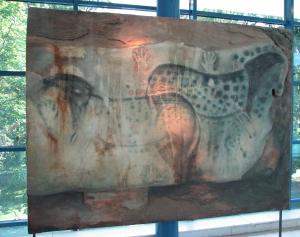
Today, I’m a caveman poet,
chiseling my rhymes into stone;
if meter’s off, will I know it?
Will centuries refine and hone?
I’ve foraged for food, built a fire;
today, I’m a caveman poet,
whose emotions -- rage and desire --
ignite my write; I must show it!
My legacy -- to bestow it;
the works of the masters inspire.
Today, I’m a caveman poet,
in pursuit of love I require.
Will my efforts cause pause to think;
Will I stifle thought or grow it?
Will we learn to be heard with ink?
Today, I’m a caveman poet.
| Author Notes |
Artwork: Painting of horses and hands from the Pech Merle cave. Gravettien. Replica in the Brno museum Anthropos.
Pech Merle is a cave which opens onto a hillside at Cabrerets in the Lot d' ├???????├??????├?????├????├???├??├?┬©partement of the Occitania region in France, about 35 minutes by road east of Cahors. It is one of the few prehistoric cave painting sites in France that remain open to the general public. Extending for more than a mile from the entrance are caverns, the walls of which are painted with dramatic murals dating from the Gravettian culture (some 25,000 years BC). Some of the paintings and engravings, however, may date from the later Magdalenian era (16,000 years BC). Quatern: A Quatern is a sixteen line French form composed of four quatrains. It has a refrain that is in a different place in each quatrain. The first line of stanza one is the second line of stanza two, third line of stanza three, and fourth line of stanza four. A quatern has eight syllables per line. It does not have to be iambic or follow a set rhyme scheme. It is speculated that this form has its inception in the middle ages, like the Retourne and Kyrielle, which are from that time period and bear similarities. (Adapted from Shadow Poetry and Poetry Magnum Opus) ~~~~~~~~~~~~~~~~~~~~~~~~~~~~~~~~~~~~~~~~~~~~~~~~~~~~~~~~ Curiously, I have yet to be able to find any adaptations or translations of quaterns in English that date back beyond the modern era. If anyone has further information on the development of this style, or any famous poets who wrote in this style, I'd be very interested if you'd like to share this information. I hope you enjoy this one! Kim A NaPoWriMo article on French Poets: http://takelessons.com/blog/french-poets-z04 |
![]()
By ~Dovey
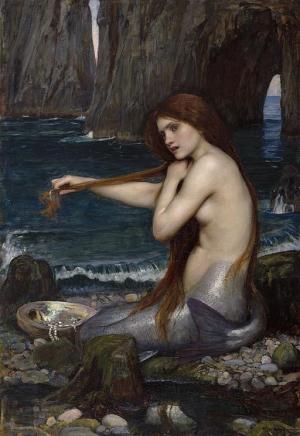
I wish I was the mermaid of the Lord;
as Tennyson, he was a poet true.
I'd swim without a worry, on accord
to catch his gaze I'd sparkle, precious view.
As time goes on I'd sing his rhyme in song,
while combing silken hair to golden hue.
A tryst in morning mist can't be so wrong;
I wished for words to woo me from my throne,
a Lord who whispered, "Come where you belong,"
his love declared on monuments of stone.
All through his life we'd love and never part,
this mortal man whose death I would bemoan.
Though he was gone, he left behind my heart,
in pieces, glimmering upon the sand,
his words were left, but now with us, apart --
my hair had bronzed, I sat with comb in hand.
'Twas then the artist, Waterhouse, he drew;
immortalized, I never looked so grand.
And now the artist, too, has gone away,
my combs have slipped and chipped; tarnished by clay.
I wish I was the mermaid of the Lord;
I'd swim without a worry, on accord.
| Author Notes |
Artwork: John William Waterhouse [Public domain], via Wikimedia Commons, The Mermaid, 1901
The Lauranelle, created by Laura Lamarca, is a hybrid (variation) of both the Villanelle and the Terzanelle forms. The poem is 22 lines in length opposed to the 19-line length of the aforementioned classical forms. Lines MUST be 10 syllables in length and also MUST be in iambic pentameter. Rhyme scheme is as follows: aba bcb cdc ded efe fbf ggA(1)A(3) Lines 1 and 3 MUST be repeated at Lines 21 and 22. Poems can either be formatted in stanzas or as a whole piece without line-spacing. ~~~~~~~~~~~~~~~~~~~~~~~~~~~~~~~~~~~~~~ This is my very tardy Poetry Potlatch entry for April 1st. The topic was... a wish, to be written in the Lauranelle style of poetry. My inspirations are the artwork, titled, The Mermaid, painted by John William Waterhouse in 1900 - 1901 and the poem, also titled, The Mermaid by Lord Alfred Tennyson (1809 - 1892). The rest of the story is purely my fanciful imagination. I hope you will enjoy. Kim ~~~~~~~~~~~~~~~~~~~~~~~~~~~~~~~~~~~~~~ The Mermaid by Lord Alfred Tennyson (1809 - 1892) I Who would be A mermaid fair, Singing alone, Combing her hair Under the sea, In a golden curl With a comb of pearl, On a throne? II I would be a mermaid fair; I would sing to myself the whole of the day; With a comb of pearl I would comb my hair; And still as I comb'd I would sing and say, 'Who is it loves me? who loves not me?' I would comb my hair till my ringlets would fall Low adown, low adown, From under my starry sea-bud crown Low adown and around, And I should look like a fountain of gold Springing alone With a shrill inner sound Over the throne In the midst of the hall; Till that great sea-snake under the sea From his coiled sleeps in the central deeps Would slowly trail himself sevenfold Round the hall where I sate, and look in at the gate With his large calm eyes for the love of me. And all the mermen under the sea Would feel their immortality Die in their hearts for the love of me. III But at night I would wander away, away, I would fling on each side my low-flowing locks, And lightly vault from the throne and play With the mermen in and out of the rocks; We would run to and fro, and hide and seek, On the broad sea-wolds in the crimson shells, Whose silvery spikes are nighest the sea. But if any came near I would call and shriek, And adown the steep like a wave I would leap From the diamond-ledges that jut from the dells; For I would not be kiss'd by all who would list Of the bold merry mermen under the sea. They would sue me, and woo me, and flatter me, In the purple twilights under the sea; But the king of them all would carry me, Woo me, and win me, and marry me, In the branching jaspers under the sea. Then all the dry-pied things that be In the hueless mosses under the sea Would curl round my silver feet silently, All looking up for the love of me. And if I should carol aloud, from aloft All things that are forked, and horned, and soft Would lean out from the hollow sphere of the sea, All looking down for the love of me. |
![]()
By ~Dovey

To read a poem it takes time.
How long? I do not know.
Enunciate
and punctuate;
how long? I do not know.
I scan the pages to and fro;
my timing can't run late.
A minute long?
Is something wrong?
My timing can't run late.
Invited to participate;
my reading must be strong.
Is there a chime?
A clocking crime?
My reading must be strong.
Ten minute slot, I must prolong;
five poems picked, in rhyme.
If I read slow
will my lines flow?
Five poems picked, in rhyme.
| Author Notes |
The Poetic Asides inaugural Poet Laureate, Sara Diane Doyle, developed this form. The form is called the Roundabout. In this form, the rhyme scheme comes full circle while offering repetition of one line in each rhyme set. (lines 2 and 5 are the same)
The Roundabout is a four stanza poem, with each stanza consisting of 5 lines. The poem is written in iambic and the lines have 4 feet, 3 feet, 2 feet, 2 feet and 3 feet respectively. The rhyme scheme is abccb/bcddc/cdaad/dabba. 4 stanzas of 8-6-4-4-6 in iambic meter Today's Poetry Potlatch topic is... a clock (incorporated any way we'd like.) Alaska Women Speak journal published one of my poems in their spring issue. They also invited me to participate in a poetry reading that was held at Barnes & Noble, here in Fairbanks, AK, the evening of April 8th. I was given a ten minute time slot and asked to read my poetry. Not only did I have to decide which of my poems I wanted to read (in addition to the one they published, that was a given) I also had to figure out how to fill that ten minute slot. I got the idea to record myself reading in order to figure out how many poems it would take to fulfill my obligation. Imagine my surprise when I discovered that it only takes about one minute to read my average poem. I chose one of my longer hockey poems and was thrilled to find that reading it aloud took 4.5 minutes. In all, I chose five of my poems to read. Not only did I record them, I read them over and over, practicing in front of the mirror. I'm happy to say that they were all very well received. Participating in my first poetry reading was a fantastic experience and I've also been invited to the next meeting of the Alaska Writer's Guild. Of the seven readers tonight, three read essays or short stories and of the four of us who read poetry, I was the only one whose poetry rhymed. Other than the invitations to participate in future readings and events, the best comment I received after the reading was complimenting my smooth rhymes. (Yes, I was thrilled!) I replied that my goal is to write 30 poems this month in celebration of NaPoWriMo. To which she says, "All rhymed poetry?" (She already had indicated that she feels that writing rhymed poetry is a difficult undertaking.) I'm pretty sure she thought I was crazy. Tonight's poetry reading was the perfect end to week 1 of NaPoWriMo. The five poems I read are all in my portfolio: A Frosty Night March (by my calendar) Published in the spring 2017 issue of Alaska Women Speak Governor's Cup 2012 Lauranelle: For Poetry Thoughts of a Poetess on Emerson I'd like to thank everyone who has reviewed and given me feedback over the years, helping me get to this point. I'm very appreciative. The poem above is based on this experience. I'd also like to extend a very special thank you to fellow FanStorian, Alaskastory, who I was delighted to see in attendance at the reading. Her compliments were greatly appreciated. Kim |
![]()
By ~Dovey
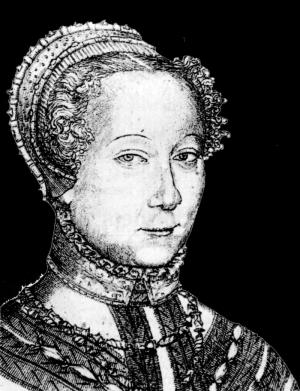
La Belle Cordière, questioned courtier;
whom legends regale, and spin quite a tale,
so vibrant was she that others would pale;
if they dared compare, 'twas wholly unfair.
It's said angels wept for want of her face;
an archer and a horsewoman divine,
dressed as a man, yet a woman defined,
la belle Amazone; so fierce, full of grace.
Though fought for Dauphin at sieged Perpignan,
the whispers, "Courtesan," drew her one flaw;
a poetess of exquisite finesse.
Louise Labè, our lady of Lyon;
as rumor is recused, dub her noblesse,
most noted as the Muse of her salon.
| Author Notes |
Artwork: Louise Labe' (1524-1566) Engraving by Pierre Woeiriot (1532-1596) (detail), 1555
In my quest for Quaterns I chanced to make the acquaintance of a French Poetess whom I'd never met before. I'd like to introduce you to her. Consider this poem over 400 years in the making, as she died more than 400 years before I was born. Perhaps, I should have saved this selection for April 25th, as that is the anniversary of her death. Louise Labe', (c. 1524, Lyon - 25 April 1566, Parcieux). I hope you enjoy the story of this lady of Lyon who I felt was nearly as dynamic as Joan of Arc, and thus, a tribute I have written. I hope that the editor doesn't have too much difficulty with the French punctuation marks. Kim https://davidandalicepark.wordpress.com/home-2/poetry/the-sonnets-of-louise-labe/sonnet-vi/ Sonnet VI By Louise Labe' (As translated by Alice Park) Twice blessed, the bright return of this clear star, My well-loved sun, makes glad my days and nights, And she, who captivates by mirrored light, Shines down in milk-white splendor from afar. O sister moon! I watch and wait for you, When twilight turns toward dark-blue skies above. It's then I feel that all my ardent love Has come to bring me joy when you're in view. While Earth and other planets one by one, Go swirling round and round my mighty sun, I'm awestruck by the beauty of deep night. And when at last my sun has washed away The eastern sky with streaks of rosy light, My lover's smiles will match this bright new day. Biography (courtesy of Wikipedia) Louise Labe' was born into a family of ropemakers, surgeons, and butchers. Her father, Pierre Charly, was a successful ropemaker, who started a business on rue de l'Arbre sec, at the base of Saint Se'bastien Hill in Lyon. When his first wife died in 1515, he married Etiennette Roybet, and had five children: Barthe'lemy, Francois, Mathieu, Claudine, and Louise. It is presumed that Louise Labe' was born at some point between her father's wedding in 1516 and her mother's death in 1523. Records show that Labe's father, despite his humble beginnings, eventually achieved some social prestige. For example, in 1534, he was summoned before the Assemble'e de Consuls of the city of Lyon to approve and participate in the founding of a relief agency for the poor. At some point, perhaps in a convent school, Labe' received an education in foreign languages (Greek, Latin, Italian, and Spanish) and music, specifically the lute. As a young woman, she was acclaimed as an extraordinary horsewoman and archer. Her early biographers called her "la belle Amazone" and report that she dressed in male clothing and fought as a knight on horseback in the ranks of the Dauphin (afterwards Henry II) at the siege of Perpignan. She was also said to have participated in tournament jousts performed in Lyon in honor of Henry II's visit. Between 1543 and 1545 she married Ennemond Perrin, also a Lyon ropemaker, a marriage dictated in her father's will, and which established the succession of the rope manufacturing business he was involved in. The business must have been prosperous, since the couple purchased a townhouse with a large garden in 1551, and, in 1557, a country estate at Parcieux-en-Dombes near Lyon. Lyon was the cultural centre of France in the first half of the sixteenth century[1] and Labe' hosted a literary salon that included many of the renowned Lyonnais poets and humanists, including Maurice Sce've, Clement Marot, Claude de Taillemont, Pontus de Tyard, and Pernette du Guillet. The poet Olivier de Magny, passing through Lyon on his way to Rome, fell in love with Labe', and is the likely subject of her love sonnets. Magny's Odes contained a poem (A Sire Aymon) that mocked and belittled Labe's husband (who had died by 1557). Perhaps inspired by the posthumous publication of Pernette du Guillet's collection of love poems in 1545, Lab├????├???├??├?┬© began writing her own poetry. On March 13, 1555, Labe' received from Henry II a privile'ge protecting her exclusive right to publish her works for a period of 5 years. Her Euvres were printed in 1555, by the renowned Lyonnais printer Jean de Tournes. In addition to her own writings, the volume contained twenty-four poems in her honour, authored by her male contemporaries and entitled Escriz de divers poetes, a la louenge de Louize Labe Lionnoize ("Writings of diverse poets, in praise of Louise Labe' of Lyons"). The authors of these praise poems (not all of whom can be reliably identified) include Maurice Sce've, Pontus de Tyard, Claude de Taillemont, Cle'ment Marot, Olivier de Magny, Jean-Antoine de Baif, Mellin de Saint-Gelais, Antoine du Moulin, and Antoine Fumee. Her contemporaries compare her to Sappho and hail Labe' as the Tenth Muse. Debate on whether Labe' was or was not a courtesan began in the sixteenth century, and has continued up to the present day. In 1557 a popular song on the scandalous behavior of La Cordie're was published in Lyon. In 1560 Jean Calvin referred to her cross-dressing and called her a plebeia meretrix or common whore. Scholars deliberate carefully over what status to accord to such statements published in a piece of religious propaganda by a writer whose tone has been described as vicious and hysterical, and similarly question to what extent the historian Paradin, writing in 1573, was aiming at neutral objectivity in writing "She had a face more angelic than human, which was yet nothing in comparison with her spirit which was so chaste, so virtuous, so poetic and of such uncommon knowledge that it would seem to have been created by God so that we may wonder at it as something prodigious." In 1564, the plague broke out in Lyon, taking the lives of some of Labe's friends. In 1565, suffering herself from bad health, she retired to the home of her companion Thomas Fortin, a banker from Florence, who witnessed her will (a document that is extant). She died in 1566, and was buried on her country property close to Parcieux-en-Dombes, outside Lyon. Debates on whether or not she was a courtesan and other aspects of her life have not always been of interest to critics who have focused increasing attention on her writings, especially her verse. |
![]()
By ~Dovey

Joseph Pulitzer
(April 10, 1847 -- October 29, 1911)
Joe Pulitzer was no real prize,
and yet, a self-made man;
so harsh that many would despise,
including his own clan.
In childhood, his affluent scrip
did not prepare for bust;
was forced to join a soldier's ship,
upon him life was thrust.
A brief stint in the Civil War;
he was an immigrant,
no combat seen, nor single scar,
a penniless vagrant.
When lifetime prospects looked so bleak;
his hankie sold for change,
and English he could barely speak,
his peers thought he was strange.
St. Louis was his promised land,
where he would prosper soon,
this waiter who had clumsy hands
became a news tycoon.
He found a place in politics;
'til he would deem corrupt,
when government and news don't mix,
the parting is abrupt.
And so it's gratitude he's shown,
for he so owned The World,
New York became his second home
and Liberty, his girl.
Now we see the irony;
though he did pay his dues,
he'd alienate progeny
and father the fake news.
This man became a millionaire,
and through unsighted eyes,
gave charity what he could spare,
saw fit to recognize
that journalists would need a school;
endowments would be made,
through yellow news - was no man's fool,
his piper had been paid.
Though not the prizes he would win,
so many bear his name;
all writers seek prestige with pen
as their acclaim to fame.
If you should win a Pulitzer,
remember, long ago --
though some proclaimed a kibitzer,
that wise man's name was Joe.
| Author Notes |
Artwork: A chromolithograph of Pulitzer superimposed on a composite of his newspapers. (courtesy of Wikipedia)
Additional reading: https://en.wikipedia.org/wiki/Joseph_Pulitzer http://www.tabletmag.com/jewish-arts-and-culture/books/29662/no-prize I'm sure we'd all love to win a Pulitzer Prize someday. |
![]()
By ~Dovey

I'm the child that was left behind;
though, not bereft by your choice,
once I was yours; another time.
When will you hear my voice?
Like a flower breaking asphalt;
I will rise up from my roots,
I'll not be fragile or broken,
for there is life in my shoots.
I'll answer my questions;
find strength and meaning in words.
Do you seek my answers?
I'll be heard.
Did you live in mansions of gold?
Was my presence deferred?
If at random we meet, will the
street be washed by tears, eyes blurred?
Were you afraid of poverty?
Love is so much more than coin,
my fortune has been knowing love,
as adoption did enjoin.
I survived abandonment;
was the stork our only bird?
Was our only tie umbilical;
is it enough to gird?
Will you pay heed to my message?
It's so important it's heard;
to reflect the attributes of glass,
to be transparent, not slurred.
From an inception sans history,
I'm heard.
Though my beginning's a mystery,
I'm heard.
I'm the light from the shadows inside,
my words are power, the stallion I ride.
Swift and impactful, it's with clarity
I'm heard,
truth on offer, with deep sincerity;
I'm heard.
The past is the past, I've forged on ahead;
echoed my life in the rhymes of the dead.
I'm heard
I'm heard
I'm heard.
| Author Notes |
This picture is me and was taken this past Saturday evening as I participated in my first poetry reading.
Maya Angelou has been a tremendous voice for all women, especially for women of color. I wanted to include her in this book because she was such a prolific woman and has made a great impact on society with her words. While I can't begin to relate to the struggles of her ancestors or speak to her life, I offer you my thoughts on my beginnings. A life built, not of privilege, but from the love of an adoptive family and the determination to make my own mark, where my past has been purloined. This poem is specifically to Mary Ann Johnson... I'm sure you are out there somewhere, or once were... as to the rest, I may never have a clue, as your name is all I know. (She was my birth mother.) I included a snippet of Maya's bio below... of particular interest to me was her given name. Such are the ironies of life. :) Kim ~~~~~~~~~~~~~~~~~~~~~~~~~~~~~~~~~~~~~~~~~~~~~~~~~~~~~~~~ I'm much more comfortable in my own rhyme schemes, but here I've attempted hers, in tribute to Maya Angelou. From And Still I Rise by Maya Angelou. Copyright ├??├?┬© 1978 by Maya Angelou. Bio excerpt from Wikipedia: Maya Angelou, who was born Marguerite Annie Johnson; (April 4, 1928 - May 28, 2014) was an American poet, memoirist, and civil rights activist. She published seven autobiographies, three books of essays, several books of poetry, and was credited with a list of plays, movies, and television shows spanning over 50 years. She received dozens of awards and more than 50 honorary degrees.[3] Angelou is best known for her series of seven autobiographies, which focus on her childhood and early adult experiences. The first, I Know Why the Caged Bird Sings (1969), tells of her life up to the age of 17 and brought her international recognition and acclaim. Read more about her: www.mayaangelou.com Still I Rise Maya Angelou, 1928 - 2014 You may write me down in history With your bitter, twisted lies, You may trod me in the very dirt But still, like dust, I'll rise. Does my sassiness upset you? Why are you beset with gloom? 'Cause I walk like I've got oil wells Pumping in my living room. Just like moons and like suns, With the certainty of tides, Just like hopes springing high, Still I'll rise. Did you want to see me broken? Bowed head and lowered eyes? Shoulders falling down like teardrops, Weakened by my soulful cries? Does my haughtiness offend you? Don't you take it awful hard 'Cause I laugh like I've got gold mines Diggin' in my own backyard. You may shoot me with your words, You may cut me with your eyes, You may kill me with your hatefulness, But still, like air, I'll rise. Does my sexiness upset you? Does it come as a surprise That I dance like I've got diamonds At the meeting of my thighs? Out of the huts of history's shame I rise Up from a past that's rooted in pain I rise I'm a black ocean, leaping and wide, Welling and swelling I bear in the tide. Leaving behind nights of terror and fear I rise Into a daybreak that's wondrously clear I rise Bringing the gifts that my ancestors gave, I am the dream and the hope of the slave. I rise I rise I rise. |
![]()
By ~Dovey
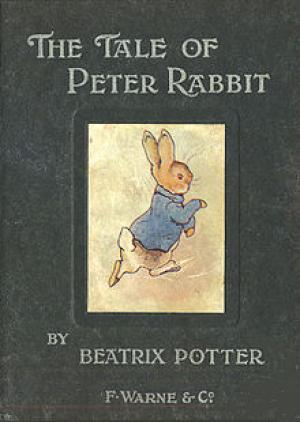
Those were the days when, without fail
our Easter morning rite;
to read,
the classic Peter Rabbit tale,
as it brought such delight,
agreed?
When eggs we'd color, bold and bright,
or pastel, like the Spring
flowers,
then they were hidden out of sight;
what joy the hunt would bring
for hours.
| Author Notes |
Artwork: Public domain image of the first edition, The Tale of Peter Rabbit, 1902
Memento, created by Emily Romano is a poem about a holiday or an anniversary, consisting of two stanzas as follows: the syllable count should be 8 beats for line one; 6 beats for line two; and two beats for line three. This is repeated twice for each stanza. The rhyme scheme is: a/b/c/a/b/c for each of the two stanzas. An excerpt from Allpoetry.com (https://allpoetry.com/Beatrix-Potter) Beatrix Potter 1866-1943 Helen Beatrix Potter was born in 1866, in South Kensington, London. Potter lived a secure childhood at home, with her younger brother Bertram. She was taught by governesses, and learned reading by Sir Walter Scott's novels. At age fifteen, she began a diary, and invented a code to write in it. This she continued till the age of thirty. It was decoded by the engineer Leslie Linde; after seven years of deciphering, it was published. In the 1890's, "The Tale of Peter Rabbit," and some other short animal stories, originally written to amuse the sickly child of one of her governesses, after first being rejected, were self-published. They brought her immediate recognition. Up till 1913, she continued to write her animal stories and illustrate them with water-colour. Her books portray animals wearing clothing, but otherwise, she did treat her animal or human characters realistically, without sentiment, imaginatively, but clearly. Among her stories there are a few poems, as well. Their simple humour had appealed to children and adults alike since their first publication. We have a Little Garden By Beatrix Potter, in her "Peter Rabbit" books WE have a little garden, A garden of our own, And every day we water there The seeds that we have sown. WE love our little garden, And tend it with such care, You will not find a faced leaf Or blighted blossom there. |
![]()
By ~Dovey

As the Poet Laureate for Mother Nature,
today I wish to make her message clear;
I come before the public and legislature,
to address our World's interests for this year.
I
Thus, beyond negotiations and all borders,
the time for discussion has come and gone;
so, consider these Her executive orders --
the plans to revitalize have been drawn.
It's true; our World has lost touch with humanity,
don't waste your breath, it just can't be denied.
Mankind has fallen victim to his vanity,
drastic measures will be the price of pride;
lest Nature shall release powers of destruction
afore not imagined nor told in tale,
where all hope is lost in terms of reconstruction;
apocalyptic forces breach our veil.
II
To promote both health and wealth, take a daily walk,
reconnect with great lands beset by sloth,
then hone your eye, set hands to beautify each block,
we'll recover our planet, swath by swath.
With this decree to set aside your foolish pride,
to lay down guns and stop this killing spree,
an alliance by which all nations must abide
is hereby enacted for unity.
Make no mistake, as Mother Nature has one goal;
if none comply, humanity will die!
It has come! The critical hour to make Her whole;
not rich, or poor, nor ISIS can defy.
III
From this day on, it's the task of our World leaders,
who, from their vaulted stands have sworn an oath;
to champion all life and to be the seeders --
to propagate and nurture all new growth,
to eradicate all known illness born to man,
and treat all nations with their due respect.
Today, you'll witness, and take heed that, "Yes, we can!"
There's no use living a life of regret.
Wherein, I must insist, with regard to others;
you'll help yourself with each contribution,
somehow we're all connected; sisters, brothers --
whom Nature won't defer retribution.
IV
We'll open up our wallets to education;
to teach a man, not just provide his fish,
to advocate a cultural integration,
by which to grant each man his heartfelt wish.
When it's said each man, each woman, too, is implied;
there will be equality of gender,
where the attributes of none will be vilified,
and appreciation we will render.
When our future generations have shown knowledge,
and when their aspirations become ours,
only then, it's our selfishness we'll acknowledge;
and once again, find blessings in the stars.
V
With these tenets -- World rights -- we'll avert our dire plight;
to which, all generations will endure;
our ideas we'll merge, of the best and the bright,
the future of this planet, we'll secure.
We'll step away from screens, reacquainted, it seems,
with one another and our Mother Earth.
With hopes renewed, new skills ensue; we'll chase our dreams,
meanwhile, reveling in our planet's rebirth.
Regardless of station or registered nation;
we'll find merit, upon which we may dwell,
in our souls we'll recognize self-vindication,
and our faces, depicted by Norman Rockwell.
| Author Notes |
Length of Post: 495 Words
Artwork: "The Golden Rule" by Norman Rockwell, 1961 found in a public domain search with this caption: Norman Rockwell painting in the United Nations. Norman Rockwell (1894-1978), Golden Rule, 1961. Oil on canvas, 44 1/2" x 39 1/2". Story illustration for The Saturday Evening Post, April 1, 1961. Norman Rockwell Museum Collections. ┬©SEPS: Curtis Licensing, Indianapolis, IN. An excerpt from Wikipedia: Norman Perceval Rockwell (February 3, 1894 - November 8, 1978) was a 20th-century American author, painter and illustrator. His works enjoy a broad popular appeal in the United States for their reflection of American culture. Rockwell is most famous for the cover illustrations of everyday life he created for The Saturday Evening Post magazine over nearly five decades.[2] Among the best-known of Rockwell's works are the Willie Gillis series, Rosie the Riveter, The Problem We All Live With, Saying Grace, and the Four Freedoms series. He also is noted for his 64-year relationship with the Boy Scouts of America (BSA), during which he produced covers for their publication Boys' Life, calendars, and other illustrations. These works include popular images that reflect the Scout Oath and Scout Law such as The Scoutmaster, A Scout is Reverent[3] and A Guiding Hand,[4] among many others. My other inspiration was this song by Louis Armstrong, "What a Wonderful World." I hope you enjoy the music as much as I do. Kim |
![]()
By ~Dovey
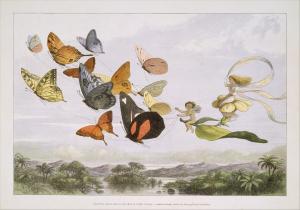
Whene'er you spy a tear in little child's eye,
allay their fears with this lullaby on tears.
If they cry, and then they see a butterfly
as Death has come, then their loved one reappears,
for their kiss holds magic bliss Death won't defy;
thus they should kiss the butterfly who appears,
then dry their tears, with no need to be forlorn;
for that's the instant, by love, a fairy's born.
| Author Notes |
The Octava Real is the Spanish version of the Ottava Rima. This 14th century stanzaic form, like its Italian counterpart, is a narrative, often telling the story of important events.
The Octava Real is: * stanzaic, written in any number of octaves. * hendecasyllabic, written in 11 syllable lines. * rhymed, abababcc. * a narrative, tells a story. In the Public Domain - The Artwork: (metmuseum.org) In Fairyland: A Series of Pictures from the Elf-World Artist:Richard Doyle (British, London 1824 - 1883 London) Author:Poems by William Allingham (Irish, Ballyshannon, Donegal 1824 - 1889 Hampstead, London) Engraver:Engraved and printed in color by Edmund Evans (British, Southwark, London 1826 - 1905 Ventnor, Isle of Wight) Publisher:Longman, Green, Reader and Dyer (London) Date:1870 Medium:Illustrations: color wood engraving and color lithography My thought process of the day: I was browsing public domain images of classic art. I found a piece that I really liked by a Spanish artist. The artwork is of a fairy. Since the artist was Spanish, I thought I'd read up on forms of Spanish poetry, to my delight I found several. I chose one of the forms and began to write this poem. I had it almost done and realized that the artwork I'd chosen wasn't a good match for the poem. I did another search and found one I felt was perfect. Upon further research, I discovered that this piece (pictured above) had been used as an illustration in a book of poems by William Allingham in 1870. From there I went to see if I could find some of his poems. I found this one (printed below) at poemhunter.com. It is titled, The Fairies. Those who know a little something about where I'm from might smile at the irony of me finding this piece of poetry today, just as I did. And thus, for a few moments, I've fancied William Allingham the King, and myself, the Queen of the gay Northern Lights. That being said, I'll dedicate this poem to Bridget, whomever she might have been. Thank you for taking the time to read and review. Kim The Fairies by William Allingham Down the rushy glen, We daren't go a-hunting For fear of little men; Wee folk, good folk, Trooping all together; Green jacket, red cap, And white owl's feather! Down along the rocky shore Some make their home, They live on crispy pancakes Of yellow tide-foam; Some in the reeds Of the black mountain lake, With frogs for their watch-dogs, All night awake. High on the hill-top The old King sits; He is now so old and gray He's nigh lost his wits. With a bridge of white mist Columbkill he crosses, On his stately journeys From Slieveleague to Rosses; Or going up with music On cold starry nights To sup with the Queen Of the gay Northern Lights. They stole little Bridget For seven years long; When she came down again Her friends were all gone. They took her lightly back, Between the night and morrow, They thought that she was fast asleep, But she was dead with sorrow. They have kept her ever since Deep within the lake, On a bed of flag-leaves, Watching till she wake. By the craggy hill-side, Through the mosses bare, They have planted thorn-trees For pleasure here and there. If any man so daring As dig them up in spite, He shall find their sharpest thorns In his bed at night. Up the airy mountain, Down the rushy glen, We daren't go a-hunting For fear of little men; Wee folk, good folk, Trooping all together; Green jacket, red cap, And white owl's feather! |
![]()
By ~Dovey

in spring fashion
lilac hues grace butterfly shoes --
scent-sational
| Author Notes |
This definition is from simplytom.com
Haiku is a traditional Japanese poetry form composed of 3 lines of 5, 7, and 5 syllables respectively. Actually, in Japanese they're usually written in one line, but still considered 3 separate units. Contemporary international haiku usually relaxes the syllable-count restriction. In English haiku, 1-3 lines of 17 syllables or less is the norm (14 syllables is often recommended). Haiku are poems about nature and generally follow the principles of minimalism and immediacy. Immediacy refers to the sense of a scene being directly presented to your senses. A haiku tries to capture a concrete image in place and time. A season word (kigo) is usually required in the traditional form to place a poem in a specific season. A cutting word (kire) is also common to direct the flow of the poem. The satori line provides you with that aha moment which completes the experience. The most prolific haiku poet was Basho. An excerpt from the Poetry Foundation: https://www.poetryfoundation.org/poems-and-poets/poets/detail/basho Basho 1644 - 1694 The 17th-century Japanese haiku master Basho was born Matsuo Kinsaku near Kyoto, Japan, to a minor samurai and his wife. Soon after the poet's birth, Japan closed its borders, beginning a seclusion that allowed its native culture to flourish. It is believed that Basho's siblings became farmers, while Basho, at Ueno Castle in the service of the local lord's son, grew interested in literature. After the young lord's early death, Basho left the castle and moved to Kyoto, where he studied with Kigin, a distinguished local poet. During these early years Basho studied Chinese poetry and Taoism, and soon began writing haikai no renga, a form of linked verses composed in collaboration. |
![]()
By ~Dovey
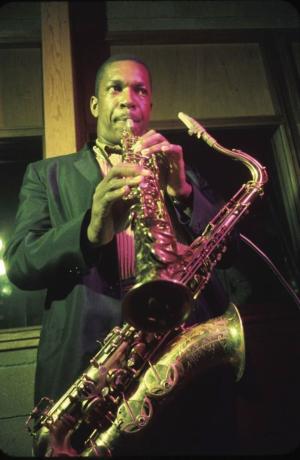
| Author Note: | In tribute to John Coltrane, legendary Jazz musician |
The world of Jazz was sad that day,
as Coltrane succumbed to
cancer.
He was forty when whisked away.
"Why, Reaper, why? Won't you
answer?"
Now I've surpassed his days on Earth;
what wicked turn of fate
will chime?
He died as I arrived in birth;
but what if I'd been late
that time?
| Author Notes |
Poetry Potlatch Challenge Topic: Write a Memento Poem about your birthday.
Memento, created by Emily Romano is a poem about a holiday or an anniversary, consisting of two stanzas as follows: the syllable count should be 8 beats for line one; 6 beats for line two; and two beats for line three. This is repeated twice for each stanza. The rhyme scheme is: a/b/c/a/b/c for each of the two stanzas. I don't mind saying that I struggled with this one. On my fourth attempt I finally came up with something I wanted to post. I went at this topic from several different perspectives. Most of them involved the fact that I will be 50 on July 17th this year (in one fashion or another and most took a more humorous approach.) Indirectly, this one addresses that fact, too, without any humor. I hope you enjoy where this ended up, although it admittedly isn't a happy poem. I feel that it really fits in my Echoes of Artistry book, for John Coltrane truly was a legendary Jazz artist. I hope you will enjoy his bio and the video, too. I borrowed the title of this poem from the title of one of the selections he plays in the video, "But Not For Me." Thanks for reading and reviewing. Kim Picture: Courtesy of a public domain search, found on Pinterest. An excerpt from Wikipedia: John William Coltrane, also known as "Trane" (September 23, 1926 - July 17, 1967),[1] was an American jazz saxophonist and composer. Working in the bebop and hard bop idioms early in his career, Coltrane helped pioneer the use of modes in jazz and was later at the forefront of free jazz. He led at least fifty recording sessions during his career, and appeared as a sideman on many albums by other musicians, including trumpeter Miles Davis and pianist Thelonious Monk. As his career progressed, Coltrane and his music took on an increasingly spiritual dimension. Coltrane influenced innumerable musicians, and remains one of the most significant saxophonists in music history. He received many posthumous awards and recognitions, including canonization by the African Orthodox Church as Saint John William Coltrane and a special Pulitzer Prize in 2007.[2] His second wife was pianist Alice Coltrane and their son Ravi Coltrane is also a saxophonist. |
![]()
By ~Dovey

In baffled state I contemplate,
just what I'd had in mind;
kitchen's a mess, but I am blessed,
love lasts a long, long time,
with memories sublime.
Each dish I stand and wash by hand,
finds me another smile;
gifts of this mess, where emptiness
had left for just awhile,
left dishes in a pile.
It's then I think, with hands in sink,
Josh fills my heart with joy;
kid's busyness brings dizziness,
like any growing boy,
enamored of his toy.
Our Cooper now is on the prowl;
prone precious babe, no more.
Quickly he'll be so sneakily
rambling across the floor;
baby gates block each door.
There's no amount of mess to count
until tomorrow's chores
validate the big meal we ate;
with memories we'll store,
to last forevermore.
A floor to sweep, the laundry heap;
but happy for our guests,
come holiday, it is our way;
delighted, I'll attest,
to fill an empty nest.
And so I see the artistry -
blueberry cake I'd bake,
cute poodle begs, tri-color eggs;
dear memories we make
in pictures we don't take.
Immersed in thought, the water's hot,
just sparkles left behind.
Kitchen's now clean and I'm serene;
labor of love defined,
I really didn't mind.
| Author Notes |
Artwork: John Philip Falter (1910-1982, American) "Mother's Little Helpers" found on Pinterest.
The ABC contest required poems of five lines per stanza, each of the first four lines begin with consecutive letters of the alphabed, line five may begin with any letter. The poem may be any number of stanzas, but all must adhere to this alphabetic rule. I chose John Philip Falter's artwork because it illustrates my messy kitchen today (my dishes were piled higher lol) but also because his artwork conveys that we can find artistry anywhere, if only we just look. His scenes are Americana, of situations we all could imagine. In case you aren't familiar with his artwork, I thought you might want to check him out. https://johnphilipfaltermuseum.com/ An excerpt from Wikipedia: https://en.wikipedia.org/wiki/John_Philip_Falter John Philip Falter (February 28, 1910 - May 20, 1982), more commonly known as John Falter, was an American artist best known for his many cover paintings for The Saturday Evening Post. Falter's first Saturday Evening Post cover, a portrait of the magazine's founder, Benjamin Franklin, is dated September 1, 1943. That cover began a 25-year relationship with the Post, during which Falter produced over 120 covers for the magazine until the editors changed its cover format from illustrations to photographs. Falter commented, "There were plenty of Rockwell imitators and J. C. Leyendecker imitators. My main concern in doing Post covers was trying to do something based on my own experiences. I found my niche as a painter of Americana with an accent of the Middle West. I brought out some of the homeliness and humor of Middle Western town life and home life. I used humor whenever possible." Of Falter's 120-odd covers, nearly all were his own ideas. "Four didn't make it," he said, "probably 12 ideas were supplied by the Post." Many of his friends acted as models for his covers; four of the covers depict his close friend, the actor J. Scott Smart. Falter said that he tried "to put down on canvas a piece of America, a stage set, a framework for the imagination to travel around in." His panoramic covers with long views of people were a major departure from the Post's customary close-up designs. In fact. Norman Rockwell himself adjusted to the newer style for a time, which he later referred to as his "Falter Period." Falter once thought that The Saturday Evening Post would provide him with lifetime employment. "I was sort of going along on a ship that would never sink," he said. "It seemed that nothing could possibly happen to the Post. Then suddenly, in my middle life, I had to retool and give up my horse for a car." Falter was forced to spend much of his savings in the months that followed the demise of the Post. |
![]()
By ~Dovey
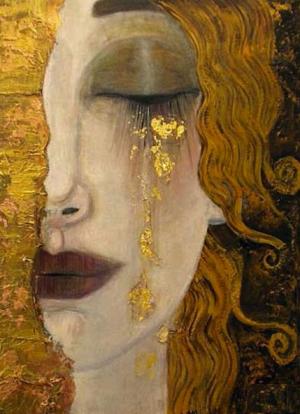
From Fairbanks, I've a golden heart,
where warmth is what we all impart;
from my soul I bleed blue and gold.
I will dance 'neath Aurora's lights
brave bears and bitter winter nights;
my mind's forget-me-not extolled.
Soft skin, with blush of Sitka rose,
no frostbit fingers, or my toes;
and yet, tears flow for days of old.
| Author Notes |
Artwork: Gustav Klimt (July 14, 1862 - February 6, 1918) was an Austrian symbolist painter and one of the most prominent members of the Vienna Secession movement. Klimt is noted for his paintings, murals, sketches, and other objects d'art. Found on a public domain search.
The Nove Otto poetry form was created by Scott J. Alcorn. It is a nine-lined poem with 8 syllables per line. The rhyme scheme is as follows: aacbbcddc. Fairbanks, Alaska (where I was raised and still live) is known as the Golden Heart City, where you will find extremely cold temperatures and people with exceptionally warm hearts. As you might have guessed, Alaska is a bit slower paced than many places on this planet. Our cities have low populations and we have a tendency to stick to the old ways of doing things. "If it ain't broke, don't fix it... and if it is broke, use duct tape!" That pretty much sums us up. Many people that live here still live in dry cabins (no running water) and use outhouses, even in the dead of winter. (Not me lol I like a few creature comforts, especially on cold winter nights.) But, we're all taught to rough it from an early age, just in case we have to. Hunting, fishing, and camping are popular pastimes, with dog mushing, skiing, sledding (snow machining) and hockey being our leading sports. When I saw this painting I felt like it was the picture of what I feel inside. So, this poem is autobiographical, though the girl in the painting looks nothing like me. Or does she? lol This is my first Nove Otto poem and it is ekphrastic (inspired by artwork) Thanks for taking the time to read and review. Kim |
![]()
By ~Dovey

By chance, I met this man just yesterday,
whose sole desire a poet was to be;
who lived a life with feet not set in clay,
and yet, his dream; inchoate victory.
While wanderlust in his life was the way;
I sensed in him the need to carry on,
his stories were the songs a minstrel sings,
in me, indeed, he'll pass on this baton.
Whilst money's not the thing that we hold dear,
we've given up the wish to live as kings;
where words in books, our legacy to share.
No statues will they set of us in sand,
our works, when gazed upon, cause no despair;
the poets who once traversed this north land.
| Author Notes |
Artwork: Taken at Pioneer Park in Fairbanks, Alaska. I chose this artwork for multiple reasons; totems are the Alaska Native culture's form of a monument, so I felt this was a good illustration for the poem. This particular one resides in Pioneer Park, which is where the Interior chapter of the Alaska Writer's Guild holds their monthly meetings. I met this man, whose name is Grant, last night at my first AWG meeting. I foresee this will become a monthly occurrence. I enjoyed the meeting/reading very much and it appears to be a friendly group. I wrote this poem based on a comment he made to me last night, that he was once supposed to be the poet of the future for Alaska, and now it is my turn. That was a happy compliment.
I was reading "Ozymandias" by Percy Busshe Shelley today. At that point I just had an idea and the first two lines of this poem kicking around in my head. I hope you'll enjoy the parallels, including his unique rhyme scheme. Everything I've read terms this as a sonnet, and it is true that it has fourteen lines with ten syllables per line. The rhyme scheme, however, does not match any sonnet rhyme scheme that I'm familiar with: ababacdcedefef. You'll notice that there are two lines in "Ozymandias" where Shelley uses near rhyme rather than perfect rhyme. I'll also give you a bit of a bio on him and hope that enjoy this selection. Kim Ozymandias by Percy Busshe Shelley (1792-1822) I met a traveller from an antique land Who said: `Two vast and trunkless legs of stone Stand in the desert. Near them, on the sand, Half sunk, a shattered visage lies, whose frown, And wrinkled lip, and sneer of cold command, Tell that its sculptor well those passions read Which yet survive, stamped on these lifeless things, The hand that mocked them and the heart that fed. And on the pedestal these words appear -- "My name is Ozymandias, king of kings: Look on my works, ye Mighty, and despair!" Nothing beside remains. Round the decay Of that colossal wreck, boundless and bare The lone and level sands stretch far away.' Percy Bysshe Shelley Percy Bysshe Shelley (1792-1822 / Horsham / England) Biography of Percy Bysshe Shelley (courtesy of Poem Hunter https://www.poemhunter.com/percy-bysshe-shelley/biography/) Percy Bysshe Shelley poet Shelley, born the heir to rich estates and the son of an Member of Parliament, went to University College, Oxford in 1810, but in March of the following year he and a friend, Thomas Jefferson Hogg, were both expelled for the suspected authorship of a pamphlet entitled The Necessity of Atheism. In 1811 he met and eloped to Edinburgh with Harriet Westbrook and, one year later, went with her and her older sister first to Dublin, then to Devon and North Wales, where they stayed for six months into 1813. However, by 1814, and with the birth of two children, their marriage had collapsed and Shelley eloped once again, this time with Mary Godwin. Along with Mary's step-sister, the couple travelled to France, Switzerland and Germany before returning to London where he took a house with Mary on the edge of Great Windsor Park and wrote Alastor (1816), the poem that first brought him fame. In 1816 Shelley spent the summer on Lake Geneva with Byron and Mary who had begun work on her Frankenstein. In the autumn of that year Harriet drowned herself in the Serpentine in Hyde Park and Shelley then married Mary and settled with her, in 1817, at Great Marlow, on the Thames. They later travelled to Italy, where Shelley wrote the sonnet Ozymandias (written 1818) and translated Plato's Symposium from the Greek. Shelley himself drowned in a sailing accident in 1822. This page is based on the copyrighted Wikipedia Percy Bysshe Shelley; it is used under the Creative Commons Attribution-ShareAlike 3.0 Unported License. You may redistribute it, verbatim or modified, providing that you comply with the terms of the CC-BY-SA. You may also find this article about the poem, "Ozymandias," interesting, too: An excerpt from Wikipedia: https://en.wikipedia.org/wiki/Ozymandias "Ozymandias" (in five syllables: /├?????├?????zi├?????m├????├???├??├?┬Žndi├?????s/, oz-ee-MAN-dee-├?????s; or four: /├?????├?????zi├?????m├????├???├??├?┬Žndj├?????s/, oz-ee-MAND-y├?????s)[1] is a sonnet written by English Romantic poet Percy Bysshe Shelley (1792-1822), first published in the 11 January 1818 issue of The Examiner[2] in London. It was included the following year in Shelley's collection Rosalind and Helen, A Modern Eclogue; with Other Poems (1819)[3] and in a posthumous compilation of his poems published in 1826.[4] "Ozymandias" is regarded as one of Shelley's most famous works and is frequently anthologised. Scansion "Ozymandias" is a sonnet, written in loose iambic pentameter, but with an atypical rhyme scheme when compared to other English-language sonnets, and without the characteristic octave-and-sestet structure. Publication history The banker and political writer Horace Smith spent the Christmas season of 1817-1818 with Percy Bysshe Shelley and Mary Shelley. At this time, members of Shelley's literary circle would sometimes challenge each other to write competing sonnets on a common subject--Shelley, John Keats and Leigh Hunt wrote competing sonnets on the Nile around the same time. Shelley and Smith both chose a passage from the writings of the Greek historian Diodorus Siculus, which described a massive Egyptian statue and quoted its inscription: "King of Kings Ozymandias am I. If any want to know how great I am and where I lie, let him outdo me in my work." In the poem Diodorus becomes "a traveller from an antique land."[7] The two poems were later published in Leigh Hunt's The Examiner,[2] published by Leigh's brother John Hunt in London. (Hunt was already planning to publish a long excerpt from Shelley's new epic, The Revolt of Islam, later the same month.) Shelley's was published on 11 January 1818 under the pen name Glirastes. It appeared on page 24 in the yearly collection, under Original Poetry. Smith's was published, along by a note signed with the initials H.S., on 1 February 1818. Shelley's poem was later republished under the title "Sonnet. Ozymandias" in his 1819 collection Rosalind and Helen, A Modern Eclogue; with Other Poems by Charles and James Ollier[3] and in the 1826 Miscellaneous and Posthumous Poems of Percy Bysshe Shelley by William Benbow, both in London.[4] Smith's poem Shelley wrote the poem in competition with his friend Horace Smith, who published his sonnet a month after Shelley's in the same magazine.[8] It takes the same subject, tells the same story, and makes a similar moral point, but one related more directly to modernity, ending by imagining a hunter of the future looking in wonder on the ruins of an annihilated London. It was originally published under the same title as Shelley's verse; but in later collections Smith retitled it "On A Stupendous Leg of Granite, Discovered Standing by Itself in the Deserts of Egypt, with the Inscription Inserted Below".[9] Both poems are presented side by side if you care to follow the link and read the article. |
![]()
By ~Dovey
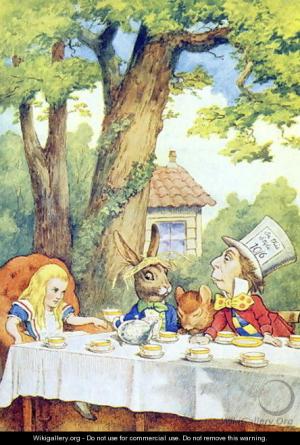
Like Alice, through the looking glass,
enthusiastic children pass
with delight into fantasy,
imagination's infancy.
Some slay the Jabberwock with speed,
chime like a clock at such a deed,
assuring all that such a feat
requires feasts of bread and meat;
resplendent things to eat and drink.
One must embrace the logic, think
long on things so gleeful, grand; and
love nonsense verse in Wonderland.
| Author Notes |
Artwork: The Mad Hatters Tea Party, illustration from Alice in Wonderland by Lewis Carroll (1865) by John Tenniel (in the public domain for non-commercial use) An excerpt from Wikipedia: https://en.wikipedia.org/wiki/Lewis_Carroll Charles Lutwidge Dodgson (27 January 1832 -14 January 1898), better known by his pen name Lewis Carroll, was an English writer, mathematician, logician, Anglican deacon, and photographer. His most famous writings are Alice's Adventures in Wonderland, its sequel Through the Looking-Glass, which includes the poem "Jabberwocky", and the poem The Hunting of the Snark, all examples of the genre of literary nonsense. He is noted for his facility at word play, logic and fantasy. There are societies in many parts of the world dedicated to the enjoyment and promotion of his works and the investigation of his life. In case you'd like more of the story: http://www.famouspoetsandpoems.com/poets/lewis_carroll/biography I chose the acrostic for this piece because another of his noted poems is simply titled, "Acrostic." I was happy to discover that he used rhyme in his acrostic poem, as it is one of my favorite styles and I almost always use rhyme in mine, too. I'm going to include a quote from my first review on this piece, by lyenochka, "I think another interesting tidbit was he was a mathematician and when Queen Victoria asked for a copy of his book, he sent her his one on mathematics." Thanks for sharing that fun fact, lyenochka! I hope you will enjoy this bit of fantasy and Lewis Carroll today. Kim Acrostic by Lewis Carroll Little maidens, when you look On this little story-book, Reading with attentive eye Its enticing history, Never think that hours of play Are your only HOLIDAY, And that in a HOUSE of joy Lessons serve but to annoy: If in any HOUSE you find Children of a gentle mind, Each the others pleasing ever-- Each the others vexing never-- Daily work and pastime daily In their order taking gaily-- Then be very sure that they Have a life of HOLIDAY. |
![]()
By ~Dovey
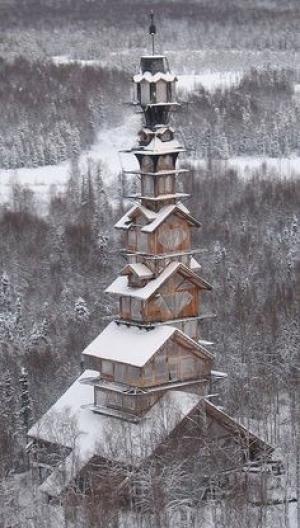
Pilot exclaims
"From in the air,
it's no wild claim,
saw Lorax there!"
His plane's now perched
up in a tree,
it was a Birch,
but soon won't be.
Now he's a-ground
and that is good,
no Lorax found
in yonder wood.
He lost his plane,
writes poetry.
Is he insane?
Then what of me?
| Author Notes |
Artwork: A house located in Willow, Alaska that is affectionately known as, "The Dr. Seuss House." Picture courtesy of Pinterest.
I haven't seen the Lorax in my back yard, does that mean I'm still sane? Ten more days of NaPoWriMo to go! I will make my goal of 30 poems. Thank you all for your support. And thank you Dr. Seuss for a cameo from the Lorax. In case you haven't heard of the Lorax, he is a Dr. Seuss character who speaks for the trees. Kim Excerpt from Wikipedia: Theodor Seuss Geisel (March 2, 1904 - September 24, 1991) was an American writer, cartoonist, animator, book publisher, and artist best known for authoring children's books under the pen name Dr. Seuss. His work includes several of the most popular children's books of all time, selling over 600 million copies and being translated into more than 20 languages by the time of his death. https://en.wikipedia.org/wiki/The_Lorax |
![]()
By ~Dovey

So thankful for this daily bread,
as stomach grumbles, grace is said,
the kitchen smells of bread fresh baked;
soup with vegetables and meat,
so hearty and so good to eat,
as hunger and strong thirst is slaked.
And though it's not the meal of kings
the satisfaction that it brings
is priceless when the stomach's ached.
| Author Notes |
Artwork: The Minnesota state photograph Grace by Eric Enstrom, depicting travelling salesman Charles Wilden in Bovey. Photograph was published in the United States in 1918 (and therefore public domain). Found at Wikimedia commons.
The Poetry Potlatch topic today is: favorite fragrance and the form is to write a Nove Otto poem. Nothing smells better than fresh baked bread, especially when you are hungry (or craving carbs - as I've been trying not to eat more than 60 carbs in a day lol) Thanks for reading and reviewing. Kim Nove Otto Poem Write a poem with only nine lines. Each line must have 8 syllables per line. The rhyme scheme is as follows: aacbbcddc. For further information on the artwork: http://www.gracebyenstrom.com/history.html |
![]()
By ~Dovey

I wandered past European gravestones.
Searching crumbled stones marking long lost bones
conjured somber tones for those all alone,
sins left to atone in weeds overgrown.
Where once the prolific Masters on Earth
sought strokes to colour the lands of their birth;
it's the estimation of supreme worth
deeply shadowed by destitution's dearth.
Here, in disguise, the languished artist lies;
where some revered as the most precious prize
of their age, have been staged in compromise,
shed a tear for those lost here; realize
though overwhelming, fate is most unjust,
these men inspired, who've held our greatest trust,
whether pious or ruled by lives of lust
drew graves unmarked, memorialized by dust.
On weathered stones these poems scribbled bear
witness to all who care, or even share
reverence for their state of disrepair;
where once brilliant men are lost to despair.
Botticelli fell, at once to her spell;
in marriage incomplete, lies at the feet
of Venus in her shell; his wish to dwell.
Michaelangelo -- whom angels applaud;
his brush was touched by fingertips of God,
a man whom centuries both love and laud.
Da Vinci's legacy -- forever etched
in memory, and drawings that he sketched;
retains an air of mystery in death,
once world was graced by God when he drew breath.
Rembrandt's portraits outlived his family,
his tragedy is his last legacy;
and once his bones were here, but he died poor,
and thus, his bones removed forevermore.
A mistress in question stole his last breath --
for Raphael, love was the kiss of death.
Vermeer, the one who mastered paint and light,
proffered his own precious pearls of insight.
Though artist and engraver he would be;
George Stubbs possessed a spirit wild and free.
As no moss gathers on the rolling stones,
wild horses animate within his bones.
Once, Donatello sculpted history;
his art remains -- all else a mystery.
A couplet for the Masters; they who gave -
Anon in life, in death an unmarked grave.
And so, this tale for some is incomplete;
while art remains as testament to skill,
their bones may be, or not, what's left to fill
these monuments erected to their feat.
| Author Notes |
Artwork found in the public domain.
My thanks to Pantygynt, who sent me on this quest with the intention of writing an epitaph for George Stubbs, to whom he may or may not be related. An inspiring challenge that grew to greater scope. I appreciate his inspiration. An interesting article: http://www.telegraph.co.uk/science/2016/05/05/leonardo-da-vinci-paintings-analysed-for-dna-to-solve-grave-myst/ In case you'd like to know more about the Old Masters referenced within this poem: https://en.wikipedia.org/wiki/Old_Master https://en.wikipedia.org/wiki/Sandro_Botticelli https://en.wikipedia.org/wiki/Leonardo_da_Vinci https://en.wikipedia.org/wiki/Donatello https://en.wikipedia.org/wiki/Michelangelo https://en.wikipedia.org/wiki/Raphael https://en.wikipedia.org/wiki/Rembrandt https://en.wikipedia.org/wiki/George_Stubbs https://en.wikipedia.org/wiki/Johannes_Vermeer |
![]()
By ~Dovey
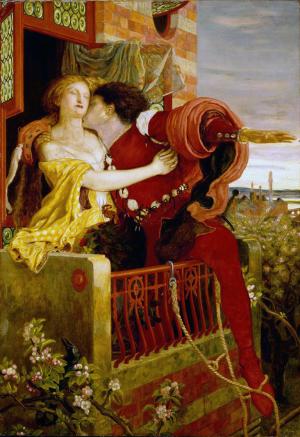
Juliet
In twenty seventeen, would Juliet
have seen her future in a brighter light?
On Ray-Banned starry eyes – would lens beget
a look so clear to see impending plight?
Would she have been too much preoccupied,
by joining other women on a march,
to contemplate the role of teenage bride?
Instead, she’d count her calories and starch?
Too busy reading Vogue and Seventeen,
or various and sundry fashion mags,
in store fronts would she peek, in Ulta preen,
and shop online for trendy Prada bags?
No Romeo is worth such tragedy,
and star-crossed love was never meant to be.

| Author Notes |
The Artwork: Romeo and Juliet by Ford Madox Brown 1870 found in the public domain at Wikimedia.
In Italics: Brand Names: Ray-Bans are fashion eyewear, Vogue and Seventeen are magazines, Ulta sells high end beauty supplies, complete with a salon, and Prada makes designer accessories. The history of Romeo and Juliet courtesy of Wikipedia: https://en.wikipedia.org/wiki/Romeo_and_Juliet A belated (and updated) birthday present for William Shakespeare, which will likely have him rolling over in his grave. My apologies to the Bard, but I couldn't resist. I always thought it was cool (when I was a teen and studying his plays in school) that he died on the same day he was born. My English teacher at the time also had an April birthday. I innocently expressed my enthusiasm for this idea and stated that, "Wow, it would be really cool if you died on your birthday, too, just like Shakespeare." She wasn't nearly as enthused about that as I was, but I honestly didn't mean it should happen then, but when it was her time. Ah, the things we say as teens. Would this modern day Juliet make any better decisions than her namesake of old? Thanks for reading and reviewing. Kim William Shakespeare was an English poet, playwright, and actor, widely regarded as the greatest writer in the English language and the world's pre-eminent dramatist. He is often called England's national poet, and the "Bard of Avon". Wikipedia Born: April 23, 1564, Stratford-upon-Avon, United Kingdom Died: April 23, 1616, Stratford-upon-Avon, United Kingdom Children: Hamnet Shakespeare, Susanna Hall, Judith Quiney Did you know: William Shakespeare is the best-selling fiction author of all time (estimated 4 billion copies of work sold). wikipedia.org |
![]()
By ~Dovey

Man's spirit always rises to its best
despite the angst in which his feet are mired. Ray (Mountainwriter49)
Built by his hands;
Cedar-sided,
his work of art
consumed by flames.
Eyes of the architect absorbed
as all was lost --
intent to build anew.
Lost all inside
except for the
memories of
family love.
Lost paintings and their possessions,
but not his life,
artist lives to create.
| Author Notes |
Photo: My neighbor's house engulfed in flames.
The Sapphonic Triad is a style invented by our very own Ciliverde (Carol) and named by Pantygynt (Jim) A two-line quotation (Free verse but max total of sixteen syllables - must be concise and memorable) followed by a quatrain, four lines each of four syllables finally an 8-4-6 syllable envoi that moves us on somewhere...it should have a "satori" feeling. In light of the circumstances, today is a day for breaking the rules. I write this as the fire still burns at the bottom of my driveway. I'll be writing more, but this just needed to come out now. The smell of smoke is still in the air even though I tried to wash it all away in a long, hot shower. Wishing we had unlimited water at our disposal earlier in the day, and the expertise to save a lost cause. I've modified the Sapphonic triad form by using a 20 syllable quote and adding two stanzas, although I followed the form established in the extra stanzas without adding an additional quote. Ray's words were just what I needed. I read the Blank Verse Sonnet, "Philadelphia," by Ray (Mountainwriter49) as I was trying to clear my mind earlier. It was the first thing I clicked on to read and I found the quote above. It was exactly what I needed, even though the circumstances he referenced were of a different nature. I felt it very much applied to the situation today. Thank you, Ray, for providing me the words I needed. Kim |
![]()
By ~Dovey

I hesitate to sit and write,
that knock upon my door -
will time remove internal fright,
return me as before?
My stomach churns, the acrid smell
from fire burns, haunting where I dwell.
My stomach churns!
My stomach churns!
Envisioning the pits of Hell.
As embers fell down from the sky,
the helplessness I felt,
I couldn't fathom, wondered why
this fateful hand was dealt?
The heat prevailed, my thoughts assailed,
internally I moaned and wailed.
The heat prevailed!
The heat prevailed!
From grief, I felt my heart impaled.
Is it just yet one day removed?
So much to process still,
will situation be improved?
I fear it never will.
The fire still burned throughout the night,
fed by wind, fuels far from sight.
The fire still burned!
The fire still burned!
Flames from a distance still burned bright.
| Author Notes |
Artwork: Edvard Munch, The Scream, 1893 [Public domain or Public domain], via Wikimedia Commons
This artwork best shows how I've been feeling inside ever since my next door neighbor first knocked on my door while I was writing to say his house was on fire. I will eventually finish the piece I was working on at that time. Kim The Trijan Refrain, created by Jan Turner. consists of three 9-line stanzas, for a total of 27 lines. Line 1 is the same in all three stanzas (although a variation of the form is not to repeat the same line at the beginning of each stanza. In other words, the beginning line of each stanza can be different. The first four syllables of line 5 in each stanza are repeated as the double-refrain for lines 7 and 8. The Trijan Refrain is a rhyming poem with a set meter and rhyme scheme as follows: Rhyme scheme: a/b/a/b/c/c/d/d refrain of first 4 words of line five /c Meter: 8/6/8/6/8/8/4,4 refrain/8 http://www.webcenter11.com/content/news/CHSR-fire-displaces-family-guts-home-420430943.html |
![]()
By ~Dovey
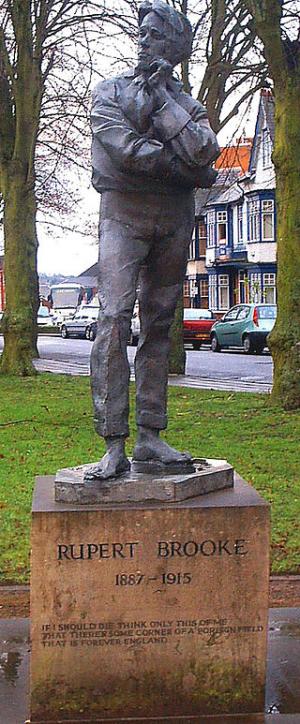
Perishing things and strange ghosts--soon to die
To other ghosts--this one, or that, or I. -- Rupert Brooke 1887-1915
Rupert Brooke
Restless in his endeavors, this clever
understated poet demonstrated
precious loss of life and youth extinguished.
Ephemerality defined, ever
reassigned, alas, rejuvenated
to symbolize what war has distinguished.
Bitten, not by a bullet, but by bug,
regret ensued as Death would take his due
on board a ship bound for the Turkish shore.
Omen, perhaps? His grave, on Skyros dug,
kept 'neath the trees where tended olives grew;
escaped Gallipoli's atrocities of war.
| Author Notes |
Artwork: G-Man at English Wikipedia - Transferred from en.wikipedia to Commons by Kafuffle using CommonsHelper. A statue of Rupert Brooke in his birth town of Rugby. Photo by G-Man Jan 2005. (Public Domain)
I am dubbing this a 'Quotable Acrostic.' My acrostic poem was inspired by the closing lines in Rupert Brooke's poem titled, "Fragment." It was further inspired by his life (and death) and his most famous poem, "The Soldier." (For anyone wondering, this is the selection I was working on earlier this week when I was alerted to the fire at my neighbor's house. Who knew we were headed to a battle of our own? Regrettably, we lost that battle, too.) Fragment (published in 1918) Rupert Brooke, 1887 - 1915 I strayed about the deck, an hour, to-night Under a cloudy moonless sky; and peeped In at the windows, watched my friends at table, Or playing cards, or standing in the doorway, Or coming out into the darkness. Still No one could see me. I would have thought of them - Heedless, within a week of battle - in pity, Pride in their strength and in the weight and firmness And link'd beauty of bodies, and pity that This gay machine of splendour 'ld soon be broken, Thought little of, pashed, scattered. ... Only, always, I could but see them - against the lamplight - pass Like coloured shadows, thinner than filmy glass, Slight bubbles, fainter than the wave's faint light, That broke to phosphorus out in the night, Perishing things and strange ghosts - soon to die To other ghosts - this one, or that, or I. The Soldier Rupert Brooke, 1887 - 1915 If I should die, think only this of me: That there's some corner of a foreign field That is for ever England. There shall be In that rich earth a richer dust concealed; A dust whom England bore, shaped, made aware, Gave, once, her flowers to love, her ways to roam, A body of England's, breathing English air, Washed by the rivers, blest by suns of home. And think, this heart, all evil shed away, A pulse in the eternal mind, no less Gives somewhere back the thoughts by England given; Her sights and sounds; dreams happy as her day; And laughter, learnt of friends; and gentleness, In hearts at peace, under an English heaven. An excerpt from Wikipedia: https://en.wikipedia.org/wiki/Rupert_Brooke Rupert Chawner Brooke (middle name sometimes given as "Chaucer";[1] 3 August 1887 - 23 April 1915[2]) was an English poet known for his idealistic war sonnets written during the First World War, especially "The Soldier". He was also known for his boyish good looks, which were said to have prompted the Irish poet W. B. Yeats to describe him as "the handsomest young man in England".[3][4] Brooke's accomplished poetry gained many enthusiasts and followers, and he was taken up by Edward Marsh, who brought him to the attention of Winston Churchill, then First Lord of the Admiralty. Brooke was commissioned into the Royal Naval Volunteer Reserve as a temporary Sub-Lieutenant[16] shortly after his 27th birthday and took part in the Royal Naval Division's Antwerp expedition in October 1914. He sailed with the British Mediterranean Expeditionary Force on 28 February 1915 but developed sepsis from an infected mosquito bite. He died at 4:46 pm on 23 April 1915, on the French hospital ship, the Duguay-Trouin (named after the famous 17th century privateer, Rene' Duguay-Trouin), moored in a bay off the Greek island of Skyros in the Aegean Sea, while on his way to the landing at Gallipoli. As the expeditionary force had orders to depart immediately, Brooke was buried at 11 pm in an olive grove on Skyros.[1][2][17] The site was chosen by his close friend, William Denis Browne, who wrote of Brooke's death:[18] I sat with Rupert. At 4 o'clock he became weaker, and at 4:46 he died, with the sun shining all round his cabin, and the cool sea-breeze blowing through the door and the shaded windows. No one could have wished for a quieter or a calmer end than in that lovely bay, shielded by the mountains and fragrant with sage and thyme. His grave remains there today.[19] Another friend - and war poet - Patrick Shaw-Stewart, also played a prominent role in Brooke's funeral.[20] On 11 November 1985, Brooke was among 16 First World War poets commemorated on a slate monument unveiled in Poets' Corner in Westminster Abbey.[21] The inscription on the stone was written by a fellow war poet, Wilfred Owen. It reads: "My subject is War, and the pity of War. The Poetry is in the pity."[22] The original wooden cross that marked his grave on Skyros, which was painted and carved with his name, was removed to Clifton Road Cemetery in Rugby, Warwickshire, to the Brooke family plot. When a permanent memorial was made for his grave on Skyros, Brooke's mother, Mary Ruth Brooke, had the original cross brought from Skyros to Rugby and placed at the plot. However, because of erosion in the open air, it was removed from the cemetery in 2008, and replaced by a more permanent marker. The original grave marker from Skyros is now at Rugby School with the memorials of other old Rugbeians.[23] https://en.wikipedia.org/wiki/Gallipoli_Campaign |
![]()
By ~Dovey
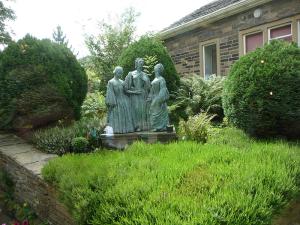
What secrets held at Haworth house
of bashful Emily?
In public, timid as a mouse,
yet strong in family.
Peek through the panes and pseudonym;
the windows of her soul and whim.
Peek through the panes!
Peek through the panes!
Conflicting as an antonym.
What secrets held at Haworth house
were hidden there within?
Why would she never take a spouse?
Was she afraid of sin?
With her own pen her passions flared,
what Catherine and Heathcliff dared --
with her own pen!
With her own pen!
What heights were reached beyond declared?
What secrets held at Haworth house
will yet remain unknown?
Will the Visionary espouse
the secrets, hers alone?
In the window the lamp burns bright,
guides the wanderer through the night.
In the window!
In the window,
innuendo's Wuthering Heights.
| Author Notes |
Photograph by Immanuel Giel 2009 (Own work) [Public domain], via Wikimedia Commons. The parsonage in Haworth, the former family home, is now the Bronte Parsonage Museum. The statue is of Charlotte, Emily, and Anne Bronte.
I used details from Emily Bronte's life and her writing as the inspiration for today's Trijan Refrain. She is one of my all time favorite author/poet figures. Her writing lives beyond her experiences and has been an inspiration to me since I was in my teens. Kim Today's Poetry Potlatch challenge is to write a Trijan Refrain on the topic of a window (used any way we like.) The Trijan Refrain, created by Jan Turner. consists of three 9-line stanzas, for a total of 27 lines. Line 1 is the same in all three stanzas (although a variation of the form is not to repeat the same line at the beginning of each stanza. In other words, the beginning line of each stanza can be different. The first four syllables of line 5 in each stanza are repeated as the double-refrain for lines 7 and 8. The Trijan Refrain is a rhyming poem with a set meter and rhyme scheme as follows: Rhyme scheme: a/b/a/b/c/c/d/d refrain of first 4 syllables of line five /c Meter: 8/6/8/6/8/8/4,4 refrain/8 An excerpt from Wikipedia: https://en.wikipedia.org/wiki/Emily_Bront%C3%AB Emily Jane Bronte (30 July 1818 - 19 December 1848)[3 was an English novelist and poet who is best known for her only novel, Wuthering Heights, now considered a classic of English literature. Emily was the third-eldest of the four surviving Bronte siblings, between the youngest Anne and her brother Branwell. She wrote under the pen name Ellis Bell. In the Preface to the Second Edition of Wuthering Heights, in 1850, Charlotte wrote: My sister's disposition was not naturally gregarious; circumstances favoured and fostered her tendency to seclusion; except to go to church or take a walk on the hills, she rarely crossed the threshold of home. Though her feeling for the people round was benevolent, intercourse with them she never sought; nor, with very few exceptions, ever experienced. And yet she knew them: knew their ways, their language, their family histories; she could hear of them with interest, and talk of them with detail, minute, graphic, and accurate; but WITH them, she rarely exchanged a word. Emily's unsociability and extremely shy nature have subsequently been reported many times.[41][42][43] According to Norma Crandall, her "warm, human aspect" was "usually revealed only in her love of nature and of animals".[44] In a similar description, Literary news (1883) states: "[Emily] loved the solemn moors, she loved all wild, free creatures and things",[45] and critics attest that her love of the moors is manifest in Wuthering Heights. Emily Bronte's Wuthering Heights was first published in London in 1847 by Thomas Cautlety Newby, appearing as the first two volumes of a three-volume set that included Anne Bronte's Agnes Grey. The authors were printed as being Ellis and Acton Bell; Emily's real name did not appear until 1850, when it was printed on the title page of an edited commercial edition.[49] The novel's innovative structure somewhat puzzled critics. Wuthering Heights's violence and passion led the Victorian public and many early reviewers to think that it had been written by a man.[50] According to Juliet Gardiner, "the vivid sexual passion and power of its language and imagery impressed, bewildered and appalled reviewers."[51] Even though it received mixed reviews when it first came out, and was often condemned for its portrayal of amoral passion, the book subsequently became an English literary classic.[52] Although a letter from her publisher indicates that Emily had begun to write a second novel, the manuscript has never been found. Perhaps Emily, or a member of her family, eventually destroyed the manuscript, if it existed, when she was prevented by illness from completing it. It has also been suggested that, though less likely, the letter could have been intended for Anne Bronte, who was already writing The Tenant of Wildfell Hall, her second novel.[53] The Visionary by Emily Bronte Silent is the house: all are laid asleep: One alone looks out o'er the snow-wreaths deep, Watching every cloud, dreading every breeze That whirls the wildering drift, and bends the groaning trees. Cheerful is the hearth, soft the matted floor; Not one shivering gust creeps through pane or door; The little lamp burns straight, its rays shoot strong and far: I trim it well, to be the wanderer's guiding-star. Frown, my haughty sire! chide, my angry dame! Set your slaves to spy; threaten me with shame: But neither sire nor dame nor prying serf shall know, What angel nightly tracks that waste of frozen snow. What I love shall come like visitant of air, Safe in secret power from lurking human snare; What loves me, no word of mine shall e'er betray, Though for faith unstained my life must forfeit pay. Burn, then, little lamp; glimmer straight and clear - Hush! a rustling wing stirs, methinks, the air: He for whom I wait, thus ever comes to me; Strange Power! I trust thy might; trust thou my constancy. If you would like to know about the Bronte family: https://en.wikipedia.org/wiki/Bront%C3%AB_family |
![]()
By ~Dovey
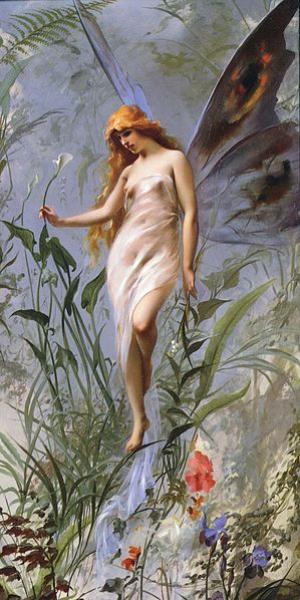
Poetry and artistry inspired --
touched by translucent fairy wings,
through my writing I've aspired
to explore diverse things.
Although, I'm tired - once
again I'll choose
an April
fairy
muse.
| Author Notes |
Artwork: Luis Ricardo Falero 1851 - 1896[Public domain], via Wikimedia Commons. Lily Fairy, 1888.
Write a nonet poem. A nonet has nine lines. The first line has nine syllables, the second line eight syllables, the third line seven syllables, etc... until line nine that finishes with just one syllable. It can be on any subject and rhyming is optional. line 1 - 9 syllables line 2 - 8 syllables line 3 - 7 syllables line 4 - 6 syllables line 5 - 5 syllables line 6 - 4 syllables line 7 - 3 syllables line 8 - 2 syllables line 9 - 1 syllable I'll be the first to say that I've not gotten a lot of sleep this month! lol I'd like to give my sincerest thanks to everyone who has followed along all month and has been as dedicated to reviewing my poems as I have been to writing them. To all the participants of NaPoWriMo /GloPoWriMo, I look forward to sponsoring this contest again next year! I'm so glad you all joined in and I hope you've had as much fun as I have with these selections. WE DID IT!!! Great job everyone!! Kim |
|
You've read it - now go back to FanStory.com to comment on each chapter and show your thanks to the author! |
![]()
| © Copyright 2015 ~Dovey All rights reserved. ~Dovey has granted FanStory.com, its affiliates and its syndicates non-exclusive rights to display this work. |
© 2015 FanStory.com, Inc. All Rights Reserved. Terms under which this service is provided to you. Privacy Statement